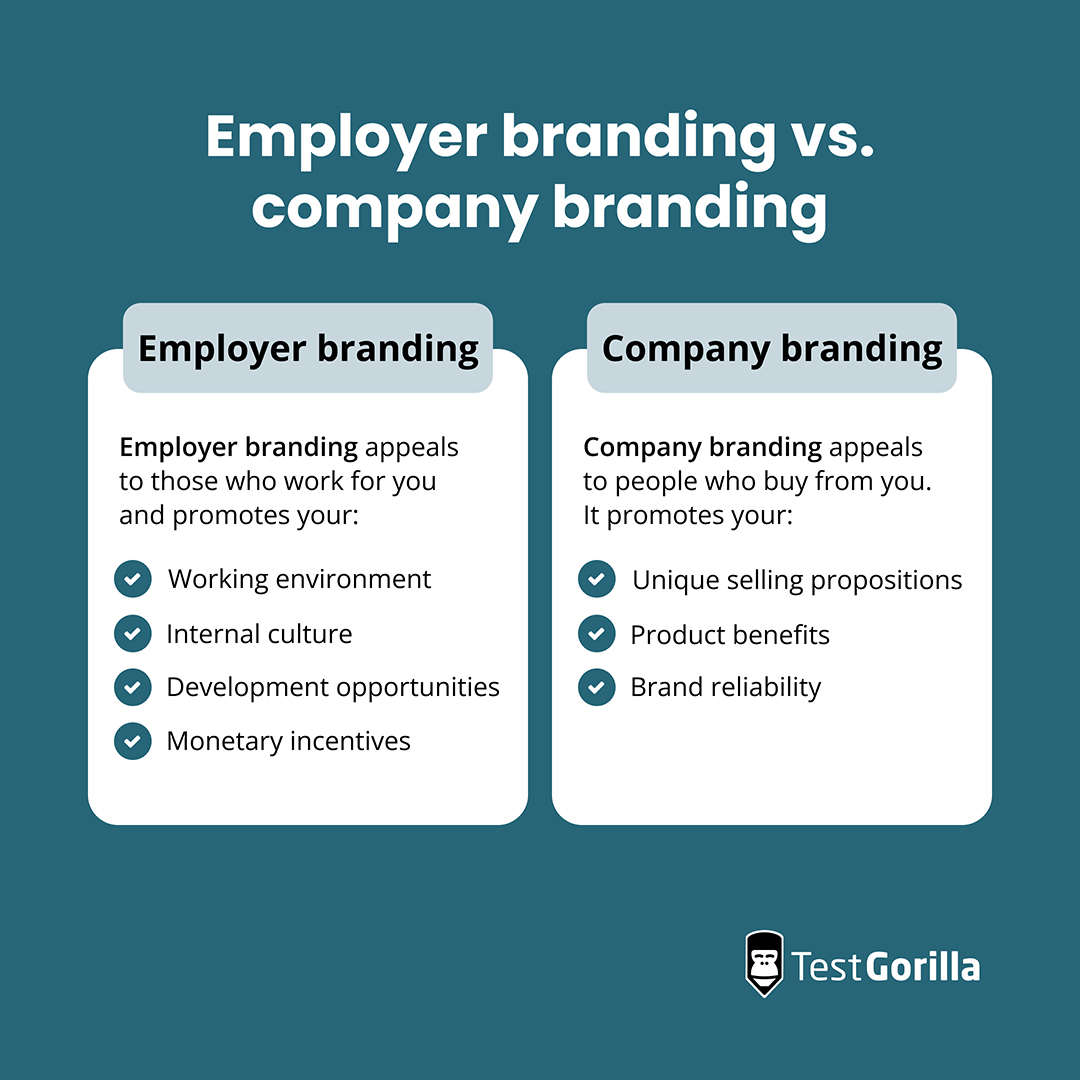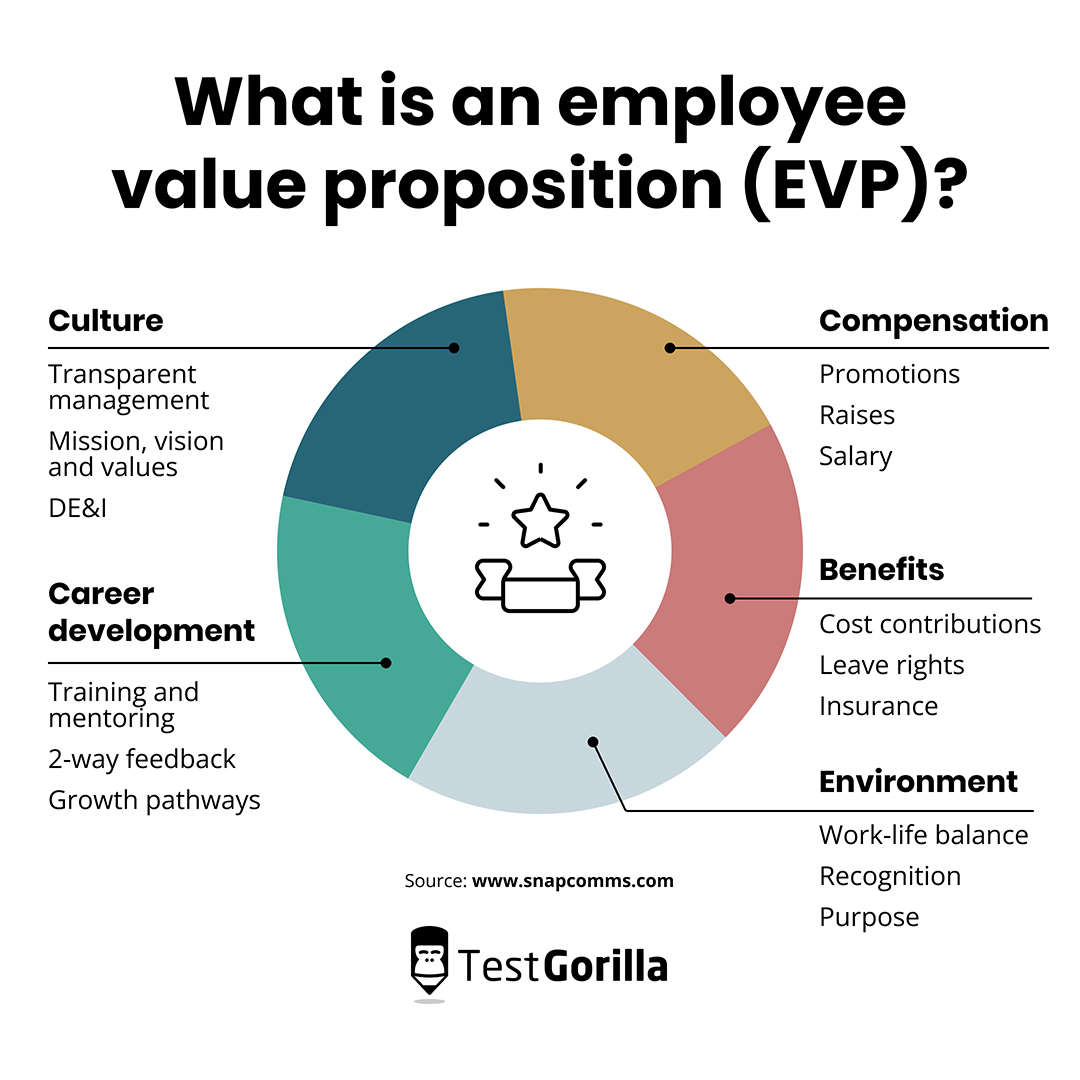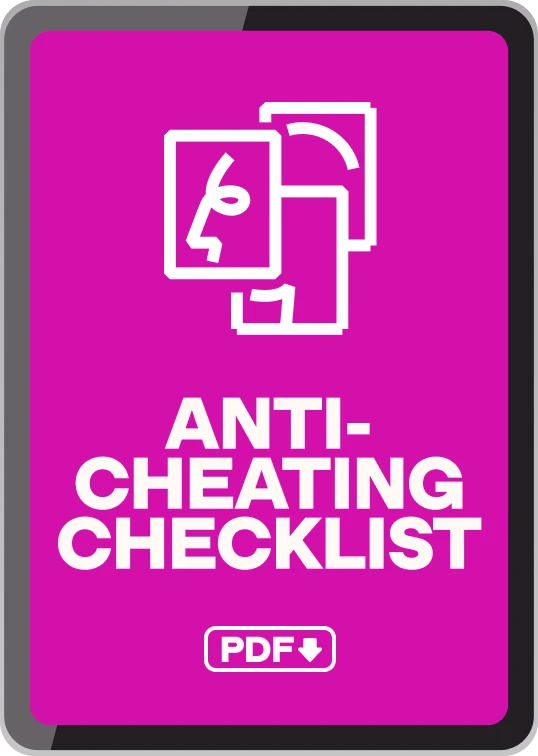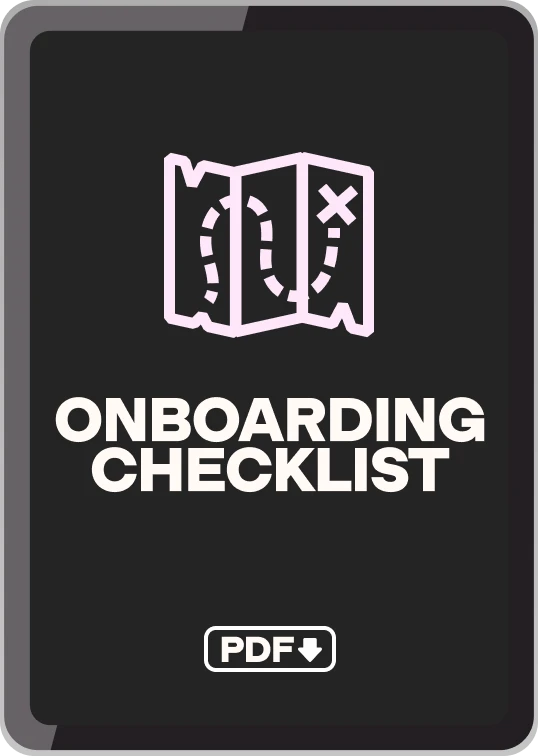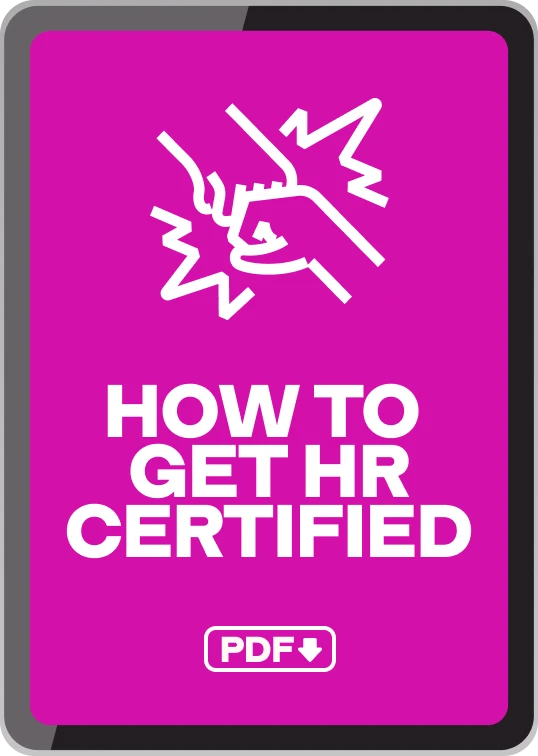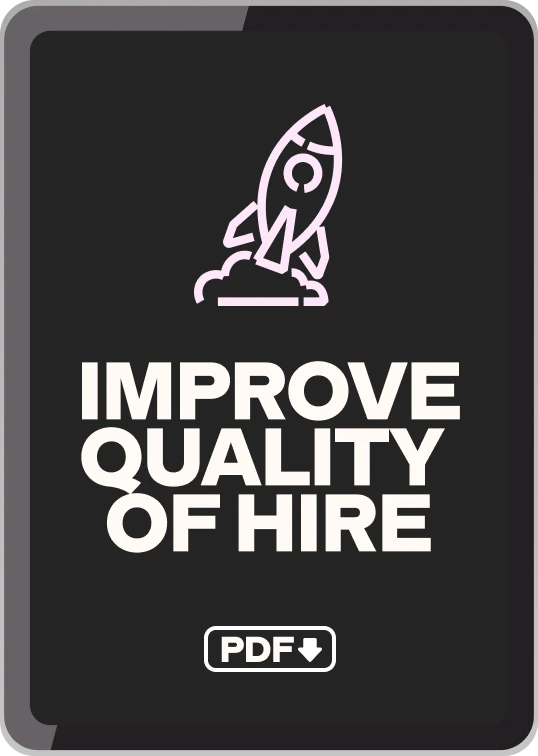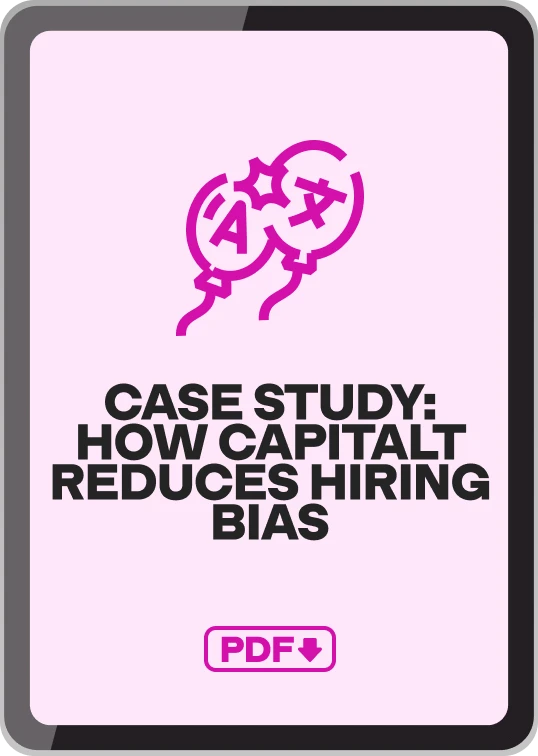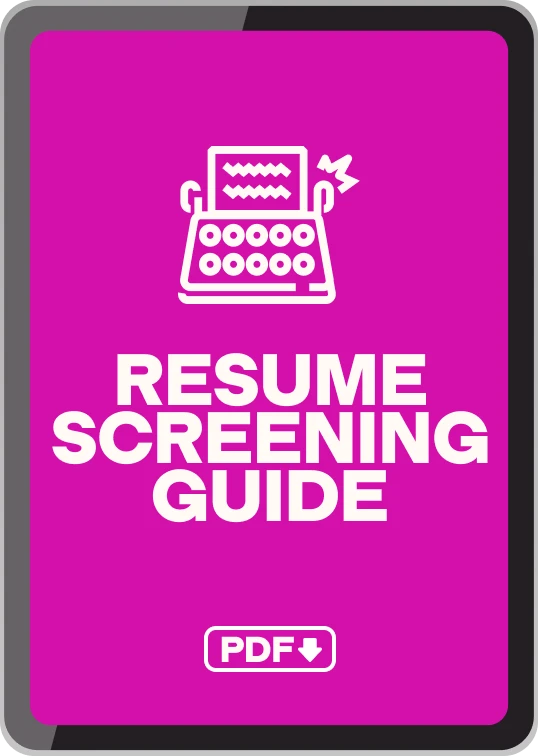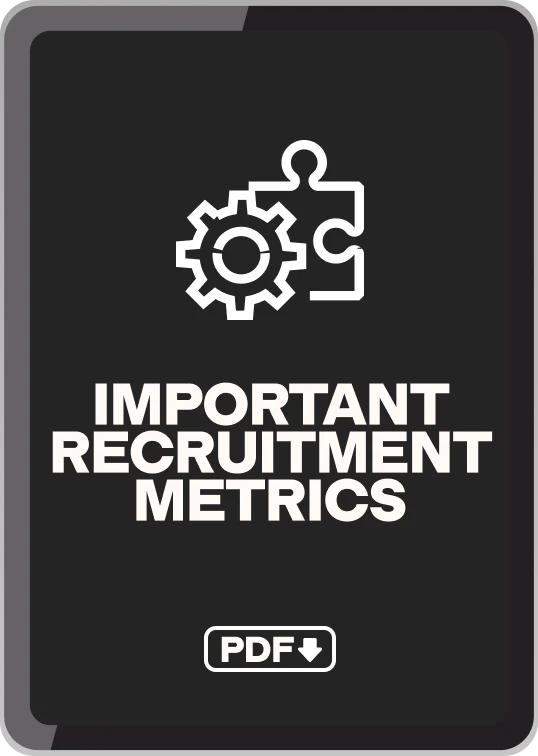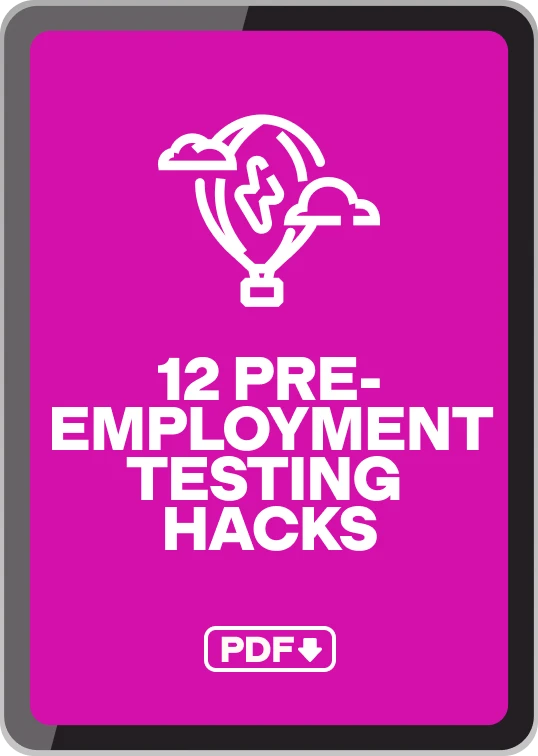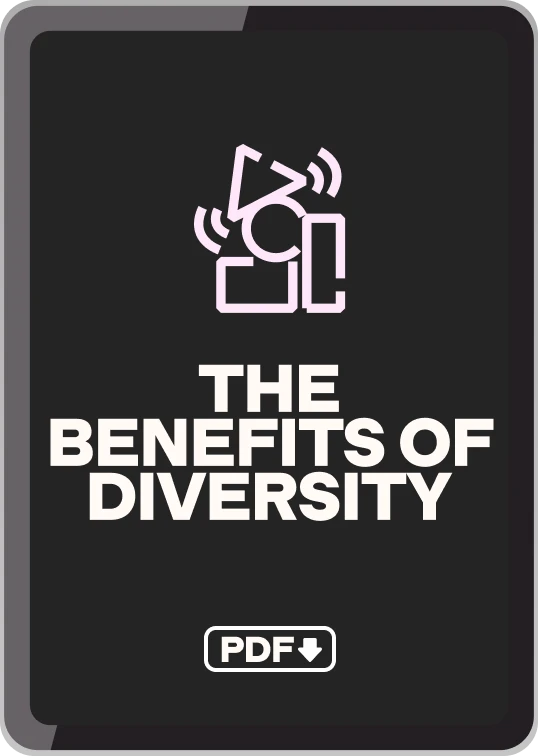Employer branding: How to leverage this talent acquisition strategy
If your company has a poor reputation for recognizing achievements or encouraging workplace empathy, you risk turning away thousands of potential candidates.
Making your company and brand attractive to candidates means more than offering competitive salaries and on-site benefits.
Applicants want to know you're positive and you put people first.
It all boils down to whether you have a strong employer brand. Alongside other talent acquisition strategies, the ideal branding plan helps you:
Appeal to talented hires looking for niche opportunities
Improve your company’s culture and reputation
Keep hard-working staff who show motivation and enthusiasm
But what is an employer brand? Why is it so different from your company brand? And how do you optimize it to boost talent acquisition?
Let's answer these questions and take a closer look at how to develop employer brand appeal.
Table of contents
- What is employer branding?
- The importance of employer branding in recruitment
- The benefits of a good employer branding strategy
- 8 best practices for leveraging employer branding to acquire top talent
- 4 employer branding examples from companies that boosted their talent pools
- Create an employer branding strategy to pitch you far and wide
What is employer branding?
Employer branding is more than a talent acquisition trend; it's your reputation as an employer through the eyes of an employee rather than a consumer or stakeholder. It's the perception of what you’re like to work for based on your recruitment marketing efforts and your employees’ (and ex-employees’) publicly-shared opinions.
Effective employer branding shows potential employees your values, your culture, and how you develop the people who work for you. It's honest and clear, showing applicants the benefits of joining your team.
It's also worth noting that employer branding is often a part of an inbound recruiting approach too.
Employer branding vs. company branding
Your employer branding definition is different from your company branding.
Employer branding appeals to those who work for you and promotes your:
Working environment
Internal culture
Development opportunities
Monetary incentives
Company branding or employer value proposition, meanwhile, appeals to people who buy from you. It promotes your:
Unique selling propositions
Product benefits
Brand reliability
Much of your employer branding revolves around why you’re a good company to work for, what sets your workplace apart from the competition, and why talent should stay with you long-term.
Once you create an appealing brand, you need the perfect employee value proposition or EVP to “close the deal.”
What is an employee value proposition (EVP)?
Your employee value proposition is what you offer to job candidates for their time, commitment, talent, and experience.
It differs from your employer brand because this is the "table offer" for potential employees, not just team members. For example, in return for their skills and loyalty, you agree to provide the following job satisfaction factors:
A competitive salary
Attractive financial bonuses
On-site benefits
Career development opportunities
Role stability and security
1:1 meetings and individual coaching
Subsidized travel
Hybrid or remote working opportunities
Here’s a visualization that goes a little more in-depth:
Your EVP is unique to your organization. Look carefully at building a balanced EVP by analyzing how your current employees feel about working for you.
For example:
Why do people choose to stay with your company?
Do compensation and benefits boost productivity and loyalty?
What motivates people to leave your firm?
What elements of your culture or workplace do staff feel are unique?
By reaching out for employee testimonials, you could build and shape an EVP that helps boost the quality of your talent pipeline.
Use your ideal candidate profile to help foster your brand and EVP. You shouldn’t create a brand purely to appeal to specific people. Instead, also focus on your needs.
Look at how a few well-known companies worked their unique employee value proposition to their advantage for inspiration. We share our favorite examples further down.
The importance of employer branding in recruitment
Statistics show 60% of employees choose their workplaces based on company values. It’s no longer an effective hiring strategy to just promote financial benefits.
Moreover, 90% of applicants value companies that maintain their brands. Therefore, to keep talent, you need to make more than just superficial changes and be honest with your staff.[1]
Careful employer branding is one of several talent acquisition strategies helping high-quality candidates easily roll into your hiring pool.
When you partner this strategy with a skills-based hiring model and an employee referral program, working for your organization becomes enticing beyond salaries.
Employees joining you because of your appealing employer branding can expect a more positive candidate experience. They're likely to stay with you longer and also recommend your brand to others.
Remember, branding helps people find workplaces that help develop the skills they’re passionate about.
Dishonestly building an employer brand that's exaggerated or a temporary "fix" increases employee turnover.
By hiring people who find your culture appealing, you continue to build on it and cement it for quality applicants. It's a self-fulfilling talent pipeline, and you don't simply hire people "in it for the money."
The benefits of a good employer branding strategy
Before diving deeper into our eight employer branding best practices, let's quickly examine how beneficial employer branding is for employers and employers.
Why employer branding in recruitment works
Benefit | Why it works |
You reduce time-to-hire | Effective employer branding helps reduce time-to-hire. It cuts out searching for candidates who are not the right fit for your workplace or values. |
You reduce hiring costs | You prevent the cost of a bad hire, and there’s less need for you to run multiple hiring campaigns to fill positions at short notice. |
It’s helpful when hiring “in bulk” | During high volume hiring, you can rely more on your brand autonomy to sort bad fits from good prospects, which also reduces your reliance on resume screening. |
You boost credibility with customers | Studies show 80% of customers choose companies and brands they trust when deciding what to buy. A company that's appealing to work for is more likely to appeal to customers. |
Your retention rates improve | Applicants joining you based on an honest, positive branding strategy are more likely to stay with you if you follow through on your promises, extending your average employee life cycle. |
You reduce recruiter effort | A positive employer branding strategy catches the interest of more applicants, reducing your need to repeat cycles or extend recruitment campaigns. |
You reduce mis-hires | Alongside skills-based hiring practices, clear and precise employer branding helps you niche down candidates who are the right fit for your workforce. |
8 best practices for leveraging employer branding to acquire top talent
Now that you’re sure of the benefits of employer branding, let’s take a detailed look at some ways to create and shape your reputation from scratch, alongside a few real-world examples.
Employer branding tips for inspiration: Summary
Best Practices | Summary |
Develop a company culture to be proud of | Fine-tune a good company culture and show applicants they can expect a supportive, inclusive, and exciting working environment. |
Audit your brand and create an effective EVP | Dig deep into what works and what doesn’t in your hiring process and decide what you need to promote to entice your ideal candidates. |
Focus on brand consistency | Follow through on commitments to prove you’re true to your word, and use talent assessments to use skills-based practices across your business. |
Create and measure branding metrics | Build your EVP with data from your existing employees’ experiences and determine what drives people to join your company. |
Build upskilling and reskilling opportunities | Show applicants you care about their development and you have multiple opportunities for them to progress within your company. |
Hire with diversity in mind | Broaden your hiring pool and show diverse applicants that you consciously avoid restrictive practices and don’t check boxes for the sake of metrics. |
Create an engaging onboarding flow | Design an application and interview process that’s interesting, varied, and clear on what candidates should expect. |
Honesty is the best policy | Always tell the truth about what it’s like to work for you. Exaggerating damages your reputation. |
1. Develop a company culture to be proud of
Up to 88% of job seekers believe company culture is important when choosing an employer.[2]
Therefore, it’s worth prioritizing your company’s culture as the backbone of your new employer brand strategy.
For example, Zoom, the video conferencing giant, is famous for its people-first culture. The company has a solid reputation for flexibility, actively listening to employees, and providing non-standard benefits.
It has also won awards for culture positivity, strengthening its brand and enticing people to work with it.
Be like this business and assess your company culture from the top down. Look carefully whether or not your company is people- or task-oriented, for example.
Consider how you address failure. Is it a learning opportunity, or does it divide people? Do people within your organization compete or collaborate?
There are two main benefits to fine-tuning your culture as your brand’s backbone:
More people apply to join you
You keep existing staff happy and reduce turnover
2. Audit your brand and create an effective EVP
All good employer branding systems revolve around a solid EVP.
You need to dig deep into your current brand setup and ascertain what you have to offer new hires, like a fair recruitment process and work-life balance.
Your EVP should ideally:
Encourage commitment and inspire loyalty
Appeal to passive hires
Show you care about people and their development
Provide insight into your workplace
Reveal available opportunities
Let’s take Airbnb, the travel booking app, as an example. The vacation service entices new employees by making inclusivity and individual support part of its core values system.
These values align with its mission to help people feel at home anywhere they go. In addition, the company offers benefits directly tied to its brand and industry, such as discounted travel perks. Here’s its video EVP.
Start building your EVP by looking at previous hiring runs. What "sealed" the contract for your most committed and highest-performing staff?
How long do new hires stay with you if you lead with initiatives instead of financial rewards?
Don’t be afraid to break down your onboarding best practices and try a few new strategies.
Use a talent assessment test strategy to ensure you onboard quality hires when experimenting.
3. Focus on brand consistency
Research shows consistency resonates with applicants even during interviewing. Always follow through on your promises and stick to your corporate purpose for clarity and consistency.
Going back on promises is a reputation destroyer.
Don’t say you believe in learning and development if you don’t intend to develop your candidates.
For example, you could follow up a skills-based hiring model by introducing similar testing opportunities within development plans.
You could use further personality testing to analyze staff and find potential opportunities they did not consider.
By standardizing a culture of talent assessments, you ensure the skills you test for consistently help staff progress and ensure you hit targets.
All of the above combine into an attractive company reputation that promotes itself.
Moreover, you keep your promises, refill your talent pool, and develop a more agile workforce.
4. Create and measure branding metrics
Tracking branding metrics helps you monitor how effective your EVP is in practice.
For example, you can survey employees on satisfaction rates.
Use a one- to five-point scale survey (and possibly a 360-degree feedback system) to gauge how staff honestly feel about working for you. Then, use this data to refine your EVP.
Beyond the workplace, as part of a social media recruiting campaign, you could track interactions (likes and shares) and impressions to measure your reach.
Measure periods to track these metrics regularly and test how results change when you fine-tune your posts.
Measuring application volumes for different roles and recruitment channels also provides lots of insight.
5. Build upskilling and reskilling opportunities
Think beyond financial incentives. Show recruits you are a company invested in learning and development. Use skills-based learning to help bring the best out of your hires.
Offer upskilling and reskilling opportunities to help them improve their chances of progressing across your company.
Upskilling your employees helps you fill specific roles within your talent mapping quickly and affordably.
It’s more efficient than rerunning the same hiring cycles.
Let’s look at McDonald’s as a transformative example. The fast food giant’s “Archways to Opportunities” program helped elevate its brand from being the butt of “entry-level employee” jokes by offering recruits extensive education opportunities.
Between 2015 and 2020, the scheme provided $65m in tuition support to its workers.
The scheme doubled the chain's employee retention potential, and Archways students more than doubled their chances of internal promotion.
Your candidates want to learn and develop instead of scouring LinkedIn or another career site for new jobs.
Up to 48% of US employees state they’d move to a new job if skills training was readily available, and 65% of those surveyed see upskilling as a reason to apply for work.
Invest money in opportunities for your staff, and make education a key part of your EVP. Consider creating an internship program or a campus recruitment program with development benefits alongside.
Beyond basic education and training, consider career pathing and build professional development plans to help your staff achieve their goals.
6. Hire with diversity in mind
There are lots of benefits to promoting diversity in the workplace and through recruitment.
A diverse workforce is likely to appeal to applicants who feel other companies discriminate against them.
However, diversity recruiting is complex. You must lead intentionally and commit to providing an open and safe environment and equal development opportunities. It's not a box-checking exercise.
Hiring diverse candidates is mutually beneficial. The broader you open the hiring field, the more talent you can access.
Highly talented people from marginalized groups feel more comfortable applying for your roles.
Therefore, show commitment to reducing unconscious bias in hiring and employment.
A good example to follow is Slack, the corporate instant messaging platform. The brand famously removed barriers preventing diverse hires instead of creating arbitrary goals and checkboxes.
The organization developed a "blind" coding review that intentionally removed defining characteristics such as age, gender, and racial identity. This strategy ensured it only hired based on skills testing.[3]
It’s a healthy approach to diversity and inclusivity because it shows candidates you’re unbiased without treating diversity as a promotional tactic.
7. Create an engaging onboarding flow
Always consider how engaging your recruitment flow is for those onboarding with your organization:
Do you provide candidates with multiple opportunities to discuss their skills and experience?
Are you clear and honest about each stage of the hiring process?
What should applicants expect if successful?
Creating more engaging interview and application processes establishes your brand as one that cares about your candidates’ experience before and after onboarding.
Introducing pre-employment skill testing helps keep the process interesting and engaging for applicants and provides useful data for measuring what they bring to your company.
Cerner, the healthcare giant, famously dismantled outdated interview techniques. The organization is well-known for its simplified, applicant-first interview process and its high scores on Glassdoor.
The firm’s vision during this process is to build relationships with candidates.
It supports applicants with travel to and from interviews, encourages relaxed conversation, and aims to create “ambassadors” out of applicants even if they don’t join.[4]
Remember, you have limited time to engage with applicants. The average time-to-hire in the US varies by industry but measures up to 49 days from application to onboarding.[5]
To keep people invested, making the process as supportive, engaging, and clear as possible is worthwhile.
8. Honesty is the best policy
Above all, authenticity in your employer branding helps build trust in external applicants.
Be honest about your internal processes, what you have to offer, and the opportunities setting you apart from the competition.
Being dishonest about your culture, values, and expectations could remove talented people from your hiring pool early.
You're effectively reducing the number of people you can choose from.
Changing the story when employees onboard isn’t wise. They could leave your company and openly share their dissatisfaction about your dishonesty and potentially toxic culture with their networks.
It further explains why remaining open and consistent is ideal for EVP success.
4 employer branding examples from companies that boosted their talent pools
Let’s examine four more employer branding examples from firms that saw marked boosts in hiring popularity.
Success stories: Summary
Organization | Summary |
Lululemon | Offers highly inclusive parental leave and extends full-time status to provide benefits to a broader pool of staff |
Eventbrite | Allows staff to choose from office, hybrid, and home working setups |
Southwest Airlines | Provides a culture of development, social responsibility, and fun |
L’Oreal | Creates stimulating work for highly talented people and avoids harmful barriers with universal messaging |
Lululemon
Lululemon Athletica, an activewear and yoga accessories provider, offers attractive employer branding through progressive and highly inclusive benefits for onboarded candidates. For example, the company provides gender-neutral parental leave from three to six months once an employee is considered eligible as a full-time employee. This perk appeals to applicants seeking LGBTQ+ inclusion in the workplace and those looking for time-off policies that genuinely support working parents.
These benefits stand apart from other companies offering gender-specific perks.
The company stands out further with its definition of full-time work. Because it defines full-time as 24 hours per week, which would otherwise be considered part-time in many companies, its employees find it easier to achieve full-time benefits faster.
As a result, up to 20% of its staff have five or more years of tenure and have become brand ambassadors. Its employer branding strategies entice staff to stay and develop with the organization.[6]
Eventbrite
Eventbrite, a ticketing brand, provides an inspiring employer brand strategy by listening to its employees and committing to making changes.
It openly shares feedback it's acted upon in the past.
For example, the company has a great workplace strategy. Instead of expecting staff to adhere to either a fixed office or remote working plan, the firm encourages employees to choose from three different hybrid models.
They can work fully in the office, in-office up to three days a week, or fully remote.[7]
The remote working debate irritates some employers.
However, this business avoids the debate with a refreshingly relaxed and flexible system to appeal to office and remote employees.
Southwest Airlines
Staff highly rate Southwest Airlines on Glassdoor and Indeed as a motivating and engaging workplace.
HR Dive also recognized the firm as its employer brand of the year in 2019.[8]
The company’s success partly stems from its good reputation in an industry plagued by customer complaints and allegations of discrimination.
The brand effectively rises above the archaic policies and toxic workplaces that affect its competitors by holding culture to a high standard when filling open roles.
In addition, the organization offers extensive training and socially responsible programs for its employees, such as education on human trafficking awareness. By investing in its people and hiring applicants that specifically add to its culture, the airline has experienced booms in hiring, with 300,000 people applying in 2017 and 2% of those eventually onboarding.
L’Oreal
L'Oreal, the beauty giant, is famous for its positive employer brand.
Much of its success comes from its focus on universality as a core value. It commits to "beauty for all" and the concept that beauty is "universal."
The brand's EVP revolves around excellence and excitement.
It offers a clear purpose for applicants to easily get behind and manifest in their own personal development plans.
The company's focus on excellence attracts applicants who strive to join brands that lead the world and who only work with highly-skilled people.
The firm’s working environment is famously stimulating and inspiring to those deeply concerned with social responsibility and sustainability.[9]
This employer branding strategy enables the business to remain a market leader worldwide and to hire consistently high-performing staff who it develops in-house with stimulating projects and opportunities.
Create an employer branding strategy to pitch you far and wide
Building an appealing employer branding profile is a talent acquisition strategy that benefits every single company.
You need to sell your experience to potential candidates if you want to hire the best talent to fit your culture.
Do you offer more flexibility in the workplace than most? Could you show candidate nurturing through an exciting and engaging onboarding process?
A solid employer branding strategy:
Refines your applicants
Cuts the cost of bad hires and repeat recruitment drives
Reduces turnover in the long term
Refills your talent pool with lucrative experts
Combine your branding setup with skills testing during recruitment and save time on poring through irrelevant resumes.
Before you build any talent assessments from scratch, head to our library for inspiration.
Sources
Del Castillo, Christine. (2015). “2016 social recruitment trends forecast”. Workable: Resources for Employers. Retrieved July 27, 2023. https://resources.workable.com/stories-and-insights/2016-social-recruitment-trends-forecast
“2018 Job Seeker Nation Study”. (April 2018). Jobvite. Retrieved July 27, 2023. https://www.jobvite.com/wp-content/uploads/2018/04/2018_Job_Seeker_Nation_Study.pdf
Nordell, Jessica. (April 26, 2018). “How Slack Got Ahead in Diversity”. The Atlantic: Technology. Retrieved July 27, 2023. https://www.theatlantic.com/technology/archive/2018/04/how-slack-got-ahead-in-diversity/558806/
Zane, Matthew. (January 2, 2023). “Top Companies with Unique Interviewing Strategies”. Zippia. Retrieved July 27, 2023. https://www.zippia.com/employer/top-companies-with-unique-interviewing-strategies/
Bika, Nikoletta. "What is the average time to hire by industry?". Workable: Resources for Employers. Retrieved July 27, 2023. https://resources.workable.com/stories-and-insights/time-to-hire-industry#average-time-to-hire-by-industry-in-the-us
“Lululemon and employer branding”. (February 21, 2019). Retail in Asia. Retrieved July 27, 2023. https://retailinasia.com/in-trends/lululemon-and-employer-branding/
Verlinden, Neelie. "9 Great Employer Branding Examples to Inspire You". Academy to Innovate HR. Retrieved July 27, 2023. https://www.aihr.com/blog/employer-branding-examples/
Moody, Kathryn. (December 9, 2019). “DIVE AWARDS 2019: Employer Brand of the Year: Southwest Airlines”. HR Dive. Retrieved July 27, 2023. https://www.hrdive.com/news/employer-brand-southwest-airlines-dive-awards/565691/
Sundberg, Jörgen. "How L'Oreal Developed a New Employer Value Proposition (EVP)". Link Humans. Retrieved July 27, 2023. https://linkhumans.com/loreal-employer-value/
Related posts
You've scrolled this far
Why not try TestGorilla for free, and see what happens when you put skills first.
Latest posts
The best advice on pre-employment testing, in your inbox.
No spam. Unsubscribe at any time.

Hire the best. No bias. No stress.
Our screening tests identify the best candidates and make your hiring decisions faster, easier, and bias-free.
Free resources
This checklist covers key features you should look for when choosing a skills testing platform
This resource will help you develop an onboarding checklist for new hires.
How to assess your candidates' attention to detail.
Learn how to get human resources certified through HRCI or SHRM.
Learn how you can improve the level of talent at your company.
Learn how CapitalT reduced hiring bias with online skills assessments.
Learn how to make the resume process more efficient and more effective.
Improve your hiring strategy with these 7 critical recruitment metrics.
Learn how Sukhi decreased time spent reviewing resumes by 83%!
Hire more efficiently with these hacks that 99% of recruiters aren't using.
Make a business case for diversity and inclusion initiatives with this data.

